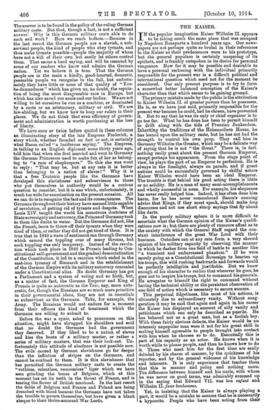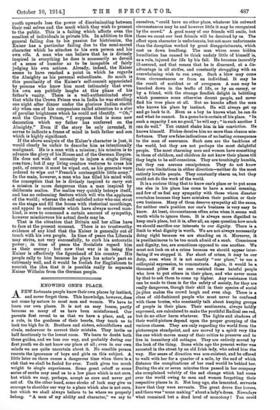THE KAISER.
IN the popular imagination Kaiser Wilhelm II. appears to be taking much the same place that was occupied by Napoleon Bonaparte a hundred years ago. Our news- papers are not perhaps quite so brutal in their references to the Kaiser as their predecessors were to his prototype, but the general populace is certainly unsparing of its epithets, and is frankly outspoken in its desire for personal vengeance. How far it may be possible and desirable to have a personal reckoning with the individual primarily responsible for the present war is a difficult political and international question which need not for the moment be considered. Our only present purpose is to try to form. a somewhat better balanced conception of the Kaiser's character than that which seems to be gaining ground.
The primary mistake made by the public is the attribution to Kaiser Wilhelm H. of greater powers than be possesses. He is, as we have just said, primarily responsible for the present war because he could, had he chosen, have prevented it. But to say that he was its only or chief organizer is to go too far. What he has done has been to permit himself to drift along with the tide of Prussian Junkerdom. Inheriting the traditions of the Hohenzollern House, he has leaned upon the military caste, but he has not had the strength to control his own prop. They call him in Germany Wilhelm the Greater, which may be a delicate way of saying that he is not " the Great." There is, in fact. nothing really great about the present German Emperor, except perhaps his appearance. From the stage point of view, he plays the part of an Emperor to perfection. He is always in the limelight, always on parade, and if great nations could be successfully governed by skilful actors Kaiser Wilhelm would have been an ideal Emperor. The trouble is that behind his good acting there is little or no solidity. He is a man of many semi-accomplishments and wholly successful in none. For example, his eloquence has never really helped him. Indeed, it has often done him harm, for he has never remembered Bacon's cunning advice that Kings, if they must speak, should make long discourses and not use short sharp sayings that fly about like darts.
In the purely military sphere it is more difficult to ascertain what the German opinion of the Kaiser's qualifi- cations now is ; but there are plenty of rumours afloat as to the anxiety with which the General Staff regard the con- stant interference of the great War Lord with their business. Outsiders can at any rate form a very shrewd opinion of his military capacity by observing the manner in which he dashes from one field of battle to another like "a transient and embarrassed phantom." If he were merely going as a Constitutional Sovereign to hearten up his troops, this wild rushing backwards and forwards would be perfectly intelligible and justifiable. But we know enough of his character to realize that wherever he goes, he goes not to inspire his troops, but to command his generals. He arrogates to himself the right to command without having the technical ability or the persistent observation of one field of action which is necessary to secure success. This perpetual fidgetiness, like most of his actions, is ultimately due to extraordinary vanity. Without exag- geration it may be said that again and again in his career the Kaiser has displayed an amount of silly vanity and pettishness which can only be described as puerile. He has behaved not as a great man, but as a foolish boy. With these fairly obvious defects, the Kaiser would be an intensely unpopular man were it not for his great skill in making himself agreeable to people brought into contact with him when he chooses so to do. Essentially this is part of his capacity as an actor. He knows when it is worth while to please people, and then he knows how to do it. Those who meet him for the first time are easily deluded by his charm of manner, by the quickness of his repartee, and by the general wideness of his knowledge and interests. It is only experience that teaches them that this is manner and policy and nothing more. The difference between himself and his uncle, with whom he was never on good terms, was admirably summed up in the saying that Edward VII. was bon enfant and Wilhelm II. faux bonhonsme.
Yet, in insisting that the Kaiser is always -playing a part, it would be a mistake to assume that he is necessarily a hypocrite. Peeple who have been acting from their youth upwards lose the power of discriminating between their real selves and the mask which they wish to present to the public. This is a failing which affects even the smallest of individuals in private life. In addition to this general failing; due to his passion for histrionics, the Kaiser has a particular failing due to the semi-sacred character which he attaches to his own person and his own rote. A man who can believe that he is divinely inspired in everything he does is necessarily so devoid of a sense of humour ae to be incapable of fairly judging his own actions. Already, indeed, the Kaiser seems to have reached a point in which he regards the Almighty as his personal subordinate. So much is this peculiarity of the Kaiser's self-conceit appreciated by persons who know him most intimately that even his own son publicly laughs at this phase of his father's vanity. There is a well-authenticated story that while the Crown Prince was in India, he was strolling one night after dinner under the glorious Indian starlit sky when one of his companions called attention to a star of peculiar brightness which he could not identify. " Oh," said the Crown Prince, " I suppose that is some new decoration which my father has conferred on the Almighty." Even if the story be only invented, it serves to indicate a frame of mind in both father and son which is highly significant.
If the above analysis of the Kaiser's character is just, it would clearly be unfair to describe him as intentionally malignant. He is a man with a mission; his mission is to advance the glory of his House and of the German Empire. He does not wish of necessity to injure a single living creature ; but if any living creature ventures to cross his path, of course it must be wiped out, as his generals were ordered to wipe out "French's contemptible little army." In the main, however, a man who has filled his mind with the conception that he is divinely inspired to carry out a mission is more dangerous than a man inspired by deliberate malice. For malice very quickly betrays itself, and has no redeeming feature which will win the applause of the world ; whereas the self-satisfied actor who can strut on the stage and fill the house with rhetorical mouthings, and appeal to sentiments which have always moved man- kind, is sure to command a certain amount of sympathy, however mischievous his actual deeds may be.
That is the situation that Britain and her allies have to face at the present moment. There is no trustworthy evidence of any kind that the Kaiser is generally out of touch with his own people. In time of peace the Liberals may strive, not very successfully, to curb his autocratic power ; in time of peace the Socialists regard him as their enemy ; but now that war is in being the Kaiser is effectively the figurehead of his country. His people rally to him because he plays his actor's part so extremely well, and it would be foolish for Englishmen to nourish the idea that it is possible really to separate Kaiser Wilhelm from the German people.



































 Previous page
Previous page